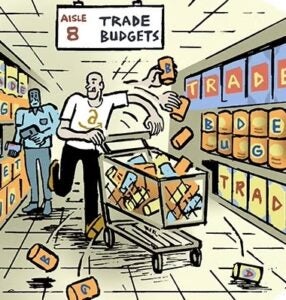“Data-Driven Thinking” is written by members of the media community and contains fresh ideas on the digital revolution in media.
Today’s column is written by Jim Lawson, CEO at AdTheorent.
The coronavirus pandemic has required a general retreat from public life, isolating people from familiar routines and social contact with friends and colleagues. The headlines are often surreal and negative. People are starving for positivity.
For many brands, the immediate response to advertising during bad times is to retreat to avoid potential negative brand association. This is understandable, especially in an acute but temporary crisis. But in the current situation, which is protracted and unfolding before a captive global digital audience, strategic invisibility may be the wrong choice.
Consumers still have wants and needs. They are eager for information and engagement, which these days means it must be delivered through digital content. And with consumers staying home and avoiding stores, events and each other, brands have a unique opportunity to craft thoughtful digital campaigns that showcase how their products, services and offerings can make people’s lives better and easier.
There is a critical difference between commercial opportunism (price gouging) and providing constructive leadership across communities looking for positivity and solutions of any kind. While it is always important to be sensitive to the advertising environment and leverage capabilities and partners that ensure brand-safe digital executions, the current national quarantine represents an opportunity to build brand loyalty by providing or highlighting important products or services, or even offering a bright spot or public service message.
For both people and institutions, it is important to be present, in a thoughtful way, to assist in easing the burdens of others. Everyone has great friends when times are good – but who is there, and how do they behave, when times are bad? These associations, when made, are strong and lasting.
The public was inspired and comforted to see major brands such as Walmart, Walgreens, CVS and Target featured as key actors in the government’s initial response to the pandemic. Leaning in at this time will benefit brands and the public, and there are numerous openings for brands of all types and sizes to contribute their offerings and capabilities.
For example, although it is not illogical for an airline or hotel to cease advertising during widespread travel restrictions, a longer-term and more strategic approach would be to remain present and heavily promote change-fee waivers and other customer accommodations that provide real relief to consumers when they are craving any form of assistance.
Rather than retreat into the background until discomfort passes, leading brands can play an active role in the recovery process, which will depend on digital engagement. Kudos to Peloton, for example, for promoting free use of its exercise app, a gesture of goodwill that will provide exercise and distractions to many, not to mention a positive association with the brand.
Perhaps short-term retail softness can be offset by this type of win-win promotion. For a quick-service or fast-casual restaurant, now is a great time to promote how the dining brand is uniquely suited to help – free delivery, no-contact curbside takeout, at-home recipes or community-based fundraising for store employees.
CPG companies have a huge opportunity to use digital advertising to make hard times easier for consumers – product-specific tutorials, vitamin and health promotion and education and special online deals that bring satisfaction and relief to consumers. Banks and insurance providers can offer customers assurances during anxious times – reinforcing brand ties through strong partnership and steadfast presence.
Brands across almost any vertical can shift their advertising messages to showcase how they’re helping the community, their customers or their employees. And brands can help simply by providing needed distractions, such as feel-good videos, entertainment or at-home exercise products and services, virtual hangout invitations or free app and game content.
It is easy to fade to black when times are bad – but stepping up, providing brand leadership and filling the void with positivity is a better long-term answer for brands seeking to grow loyal and lasting relationships.
Follow AdTheorent (@AdTheorent) and AdExchanger (@adexchanger) on Twitter.













